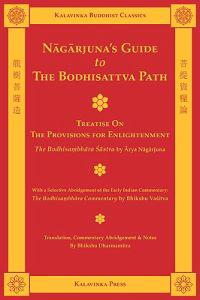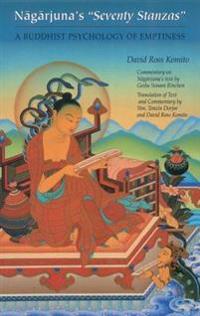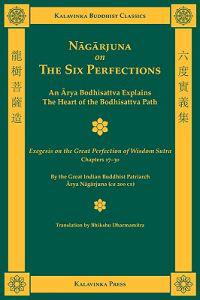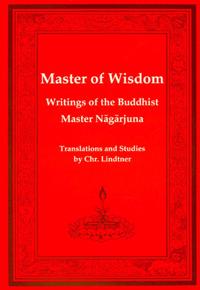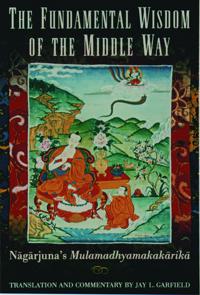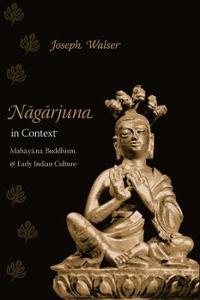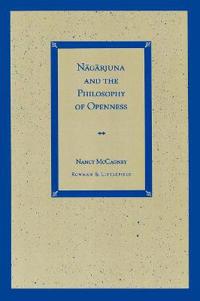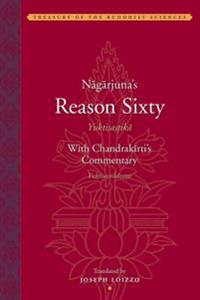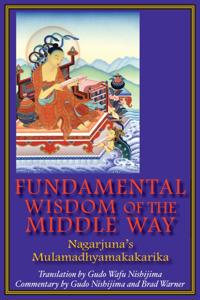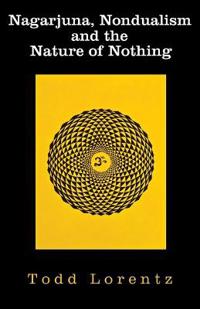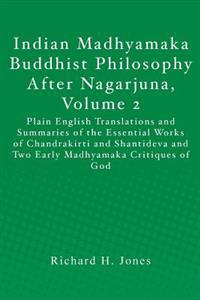Nagarjuna's Guide to the Bodhisattva Path (Häftad)
avArya Nagarjuna, Nagarjuna
ISBN: 9781935413028 - UTGIVEN: 2009-02Nagarjuna'S Letter to a Friend (Häftad)
avNagarjuna
ISBN: 9781559394154 - UTGIVEN: 2013-10An exposition of the entire Buddhist path in only 123 verses. A Buddhist classic.
Nagarjuna's poetic presentation of the fundamental teachings of the Great Vehicle, or Mahayana, is remarkable for its concise style and memorable imagery, making it one of the most widely quoted sources in other co[...]Master of Wisdom (Pocket)
avNagarjuna, Christian (TRN) Lindtner, Nagarjuna
ISBN: 9780898002867 - UTGIVEN: 1997-11Verses from the Center (Pocket)
avNagarjuna, Stephen Batchelor, Nagarjuna
ISBN: 9781573228763 - UTGIVEN: 200107The understanding of the nature of reality is the insight upon which the Buddha was able to achieve his own enlightenment. This vision of the sublime is the source of all that is enigmatic and paradoxical about Buddhism. In Verses from the Center, Stephen Batchelor explores the history of this conce[...]
A Strand of Dharma Jewels (Häftad)
avArya Nagarjuna, Nagarjuna
ISBN: 9781935413059 - UTGIVEN: 2009-02Anaximander, Heraclitus, Parmenides, Plotinus, Lao-Tzu, Nagarjuna (Häftad)
avKarl Jaspers, Hannah Arendt
ISBN: 9780156075008 - UTGIVEN: 1974-10Taken from the Great Philosphers, Volume II.
The Fundamental Wisdom of the Middle Way (Häftad)
avNagarjuna
ISBN: 9780195093360 - UTGIVEN: 199601BLA new translation from the Tibetan, with a verse-by-verse philosophical commentary in English Mulamadhyamakakarika is the foundational text for all Mahayana Buddhism and is one of the most influential works in the history of Indian philosophy.[...]
Fundamental Wisdom of the Middle Way (Inbunden)
avNagarjuna
ISBN: 9780195103175 - UTGIVEN: 199709The Buddhist saint N=ag=arjuna, who lived in South India in approximately the second century CE, is undoubtedly the most important, influential, and widely studied Mah=ay=ana Buddhist philosopher. His many works include texts addressed to lay audiences, letters of advice to kings, and a set of penet[...]
Nagarjuna's Madhyamaka: A Philosophical Introduction (Inbunden)
avJan Westerhoff
ISBN: 9780195375213 - UTGIVEN: 2009-02-19Nagarjuna's Madhyamaka (Häftad)
avJan Westerhoff
ISBN: 9780195384963 - UTGIVEN: 200909The Indian philosopher Acharya Nagarjuna (c. 150-250 CE) was the founder of the Madhyamaka (Middle Path) school of Mahayana Buddhism and arguably the most influential Buddhist thinker after Buddha himself. Indeed, in the Tibetan and East Asian traditions, Nagarjuna is often referred to as the 'secon[...]
Dispeller of Disputes, The: Nagarjuna's "Vigrahavyavartani" (Inbunden)
avJan Westerhoff
ISBN: 9780199732692 - UTGIVEN: 2010-05-13Nagarjuna in Context (Inbunden)
avJoseph Walser
ISBN: 9780231131643 - UTGIVEN: 200504Joseph Walser provides the first examination of Nagarjuna's life and writings in the context of the religious and monastic debates of the second century CE. Walser explores how Nagarjuna secured the canonical authority of Mahayana teachings and considers his use of rhetoric to ensure the transmissio[...]
Nagarjuna and the Philosophy of Openness
ISBN: 9780847686278 - UTGIVEN: 1997-10In this innovative study of the philosopher Nagarjuna, Nancy McCagney demonstrates that the concept of space ('akasa') in early Indian Mahayana Buddhism is the root metaphor for Nagarjuna's understanding of 'sunyata', or openness. Nagarjuna's use of the term 'sunyata' was new, and contrasted with th[...]
Nagarjuna's Reason Sixty Yuktisastika With Candrakirti's Commentary Yuktisastikavrtti
ISBN: 9780975373422 - UTGIVEN: 2007-05The Reason Sixty is the most concise philosophical work by the second-century Indian Buddhist philosopher Nagarjuna. It is one of that master's works most often cited by Centrist (Madhyamaka) commentators, and it is included in the Sixfold Canon of Reason (rigs tshogs drug) which forms the textual b[...]
Fundamental Wisdom of the Middle Way: Nagarjuna's Mulamadhyamakakarika (Häftad)
avNaagaarjuna, Brad Warner
ISBN: 9780983358909 - UTGIVEN: 201110This is not a standard translation of "Mulamadhyamakakarika." Translator Nishijima Roshi believes that the original translation from Chinese into Sanskrit by the Ven. Kumarajiva (circa 400 C.E.) was faulty and that Kumarajiva's interpretation has influenced every other translation since. Avoiding re[...]
Nagarjuna, Nondualism and the Nature of Nothing (Häftad)
avTodd Lorentz
ISBN: 9780987778208 - UTGIVEN: 201112Indian Madhyamaka Buddhist Philosophy After Nagarjuna, Volume 1 (häftad)
ISBN: 9781460969892 - UTGIVEN: 2011-04Nagarjuna's Tree of Wisdom a Translation (Häftad)
avDennis Waller
ISBN: 9781481169028 - UTGIVEN: 2012-12Buddhist Illogic: A Critical Analysis of Nagarjuna's Arguments (Häftad)
avAVI Sion
ISBN: 9781495928628 - UTGIVEN: 2014-02Nagarjuna (Second Edition): Buddhism's Most Important Philosopher (Häftad)
avRichard H. Jones
ISBN: 9781502768070 - UTGIVEN: 2014-10

